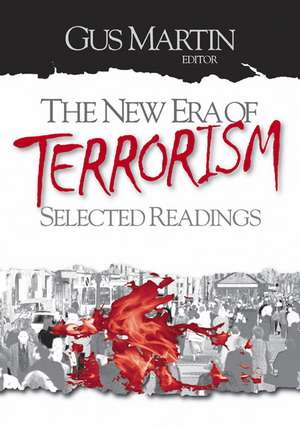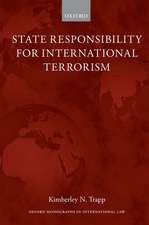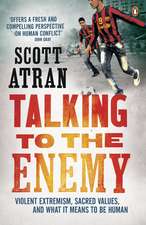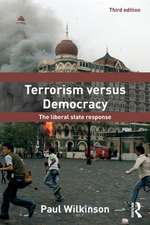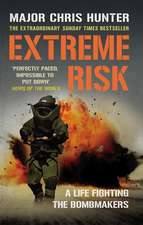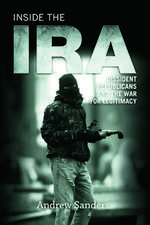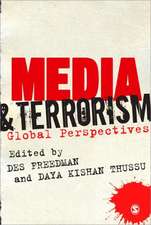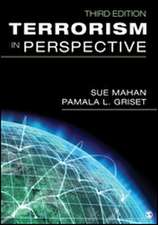The New Era of Terrorism: Selected Readings
Autor Gus Martinen Limba Engleză Paperback – 19 apr 2004
Features of this text:
Examines terrorism in the modern era and offers expert analysis of the post-September 11, 2001 environment
Delivers a current perspective on terrorism and examines the challenges that must be dealt with by the United States and nation states around the world
Develops topics logically by incrementally building upon concepts covered in previous chapters
Stimulates critical thinking by presenting provocative articles and essays taken from respected publications and providing recommended readings for further discussion
The New Era of Terrorism is an excellent supplement to Gus Martin's Understanding Terrorism: Challenges, Perspectives, and Issues (2003) or any other terrorism textbook. This anthology is recommended for advanced undergraduate and graduate students studying terrorism, homeland security, political conflict, social movements, criminal justice issues, and law enforcement. It can be used in a wide range of courses in the fields of Administration of Justice, Political Science, Criminal Justice, Sociology, and Public Administration.
Preț: 791.73 lei
Preț vechi: 870.03 lei
-9% Nou
151.51€ • 164.52$ • 127.27£
Carte disponibilă
Livrare economică 02-16 aprilie
Livrare express 18-22 martie pentru 33.48 lei
Specificații
ISBN-10: 0761988734
Pagini: 304
Dimensiuni: 178 x 254 x 16 mm
Greutate: 0.54 kg
Ediția:New.
Editura: SAGE Publications
Colecția Sage Publications, Inc
Locul publicării:Thousand Oaks, United States
Recenzii
In the reader a wide variety of analyses and opinions are given. . . While "European authors" tend to advocate an internationalist, legalistic approach, stressing the importance of coalition-building, many "American authors" are favouring a stronger, more direct approach to terrorism, showing disappointment at a weak European response. . . Overall, this is a timely, insightful read."
Cuprins
Chapter 1. Prologue: Rethinking Policy and Theory in the New Era of Terrorism
Rethinking Terrorism and Counterterrorism Since 9/11 - BruceHoffman
The Unipolar Moment Revisited - Charles Krauthammer
Foreword: Freedom and Security After September 11 - Viet Dinh
PART I. CONCEPTUALIZING THE THREAT IN THE NEW ERA
Chapter 2. The New Era in Perspective
A Historical Analysis of Mass Casualty Bombers - Chris Quillen
Harbinger or Aberration? A 9/11 Provocation - John Mueller
The Imbalance of Terror - Therese Delpech
Chapter 3. Defining Terrorism in the New Era
Terrorism: The Problem of Definition Revisited - H.H.A. Cooper
Mixed Message: Arab and Muslim Response to 'Terrorism' - Mustafa Al Sayyid
Choices of Law, Choices of War - Noah Feldman
Chapter 4. Causes of Terrorism in the New Era
Cross-Regional Trends in Female Terrorism - Karla J. Cunningham
God and Mammon: Does Poverty Cause Militant Islam? - Daniel Pipes
The Radical Right After 9/11 - Daniel Levitas
PART II. TERRORIST BEHAVIOR IN THE NEW ERA
Chapter 5. Exotic Terrorism
What it Takes to Become a Nuclear Terrorist - Friedrich Steinhausler
The Rise of Complex Terrorism - Thomas Homer-Dixon
The Culture of Martyrdom: How Suicide Bombing Became not Just a Means but an End - David Brooks
Chapter 6. The New Era of Religious Terrorism
Just War, Jihad, and Terrorism: A Comparison of Western and Islamic Norms for the Use of Political Violence - Adam L. Silverman
Must Innocents Die? The Muslim Debate Over Suicide Attacks - Haim Malka
The New Terrorism: Securing the Nation Against a Messianic Foe - Steven Simon
Chapter 7. The Near-Future of Terrorism
The Terrorist Calculus Behind 9-11: A Model for Future Terrorism? - Brigitte L. Nacos
Can Terrorists Get the Bomb? - Gary Milhollin
Russia, Islam, and the War on Terrorism: An Uneasy Future - Ariel Cohen
PART III. WHAT IS TO BE DONE? POLICY CHOICES IN THE NEW ERA
Chapter 8. Issues and Challenges for Counterterrorism
There Are No Rules' (George W. Bush): International Order After September 11 - Andrew Hurrell
Rights, Liberties, and Security: Recalibrating the Balance After September 11 - Stuart Taylor, Jr.
A Nasty Business - Bruce Hoffman
Chapter 9. Counterterrorist Options in the New Era
Terrorism and the Use of Force - Geir Ulfstein
A New Strategy for the New Face of Terrorism - Paul L. Bremer, III
Smarter Intelligence - John Deutch and Jeffrey H. Smith
Chapter 10. Forging Alliances in the New Era
The End of the Unipolar Moment? September 11 and the Future of World Order - Steve Smith
The Future of International Coalitions: How Useful? How Manageable? - Paul Dibb
They the People: Our Abandoned Muslim Allies - Azar Nafisi
Notă biografică
C. Augustus ¿Gus¿ Martin is Director of the School of Public Service and Justice at California State University, Dominguez Hills. He is also a Professor of Criminal Justice Administration, where he regularly teaches a course on the subject of terrorism and extremism. He has served as Associate Vice President for Human Resources Management, Acting Associate Dean of the College of Business Administration and Public Policy, Associate Vice President for Faculty Affairs, and Chair of the Department of Public Administration. He began his academic career as a member of the faculty of the Graduate School of Public and International Affairs, University of Pittsburgh, where he was an Administration of Justice professor. His current research and professional interests are terrorism and extremism, homeland security, the administration of justice, and juvenile justice.
Dr. Martin is author of several books on the subjects of terrorism and homeland security, including Essentials of Terrorism: Concepts and Controversies (SAGE Publications, 2022); Understanding Terrorism: Challenges, Perspectives, and Issues (SAGE Publications, 2021); Understanding Homeland Security (SAGE Publications, 2020); Terrorism: An International Perspective (with Fynnwin Prager; SAGE Publications, 2019); The SAGE Encyclopedia of Terrorism, Second Edition (SAGE Publications, 2011); Terrorism and Homeland Security (SAGE Publications, 2011); and The New Era of Terrorism: Selected Readings (SAGE Publications, 2004). He is also author of Juvenile Justice: Process and Systems (SAGE Publications, 2005).
Prior to joining academia, Dr. Martin served as Managing Attorney for the Fair Housing Partnership of Greater Pittsburgh, where he was also director of a program created under a federal consent decree to desegregate public and assisted housing. He was also Special Counsel to the Attorney General of the U.S. Virgin Islands on the island of St. Thomas. As Special Counsel, he occupied a personal and confidential position in the central office of the Department of Justice; sat as hearing officer for disciplinary hearings and departmental grievances; served as chair of the Drug Policy Committee; served as liaison to the intergovernmental Law Enforcement Coordinating Committee as well as to the Narcotics Strike Force; and provided daily legal and policy advice to the Attorney General. Prior to serving as Special Counsel, he was a ¿floor¿ Legislative Assistant to Congressman Charles B. Rangel of New York. As Legislative Assistant, he researched, evaluated and drafted legislation in areas of foreign policy, foreign aid, human rights, housing, education, social services, and poverty; he also drafted House floor statements, Congressional Record inserts, press releases, and news articles; and he composed speeches, briefing materials, and legislative correspondence.
